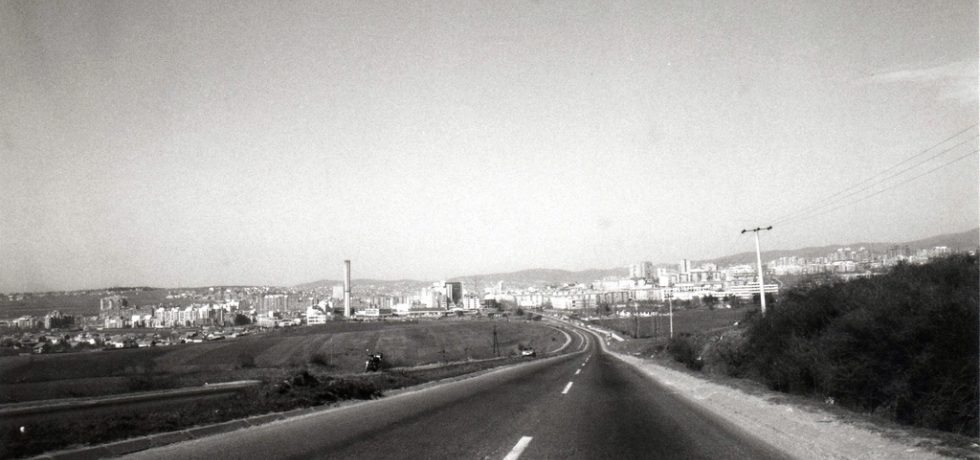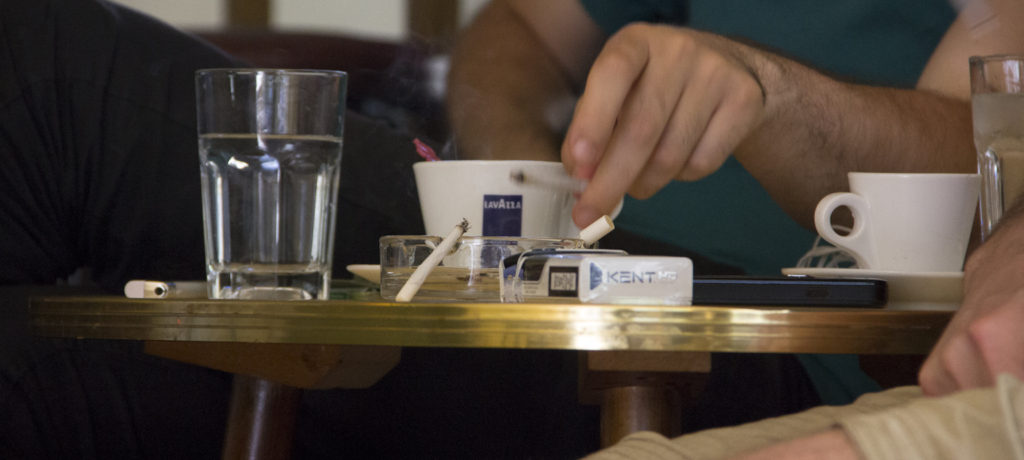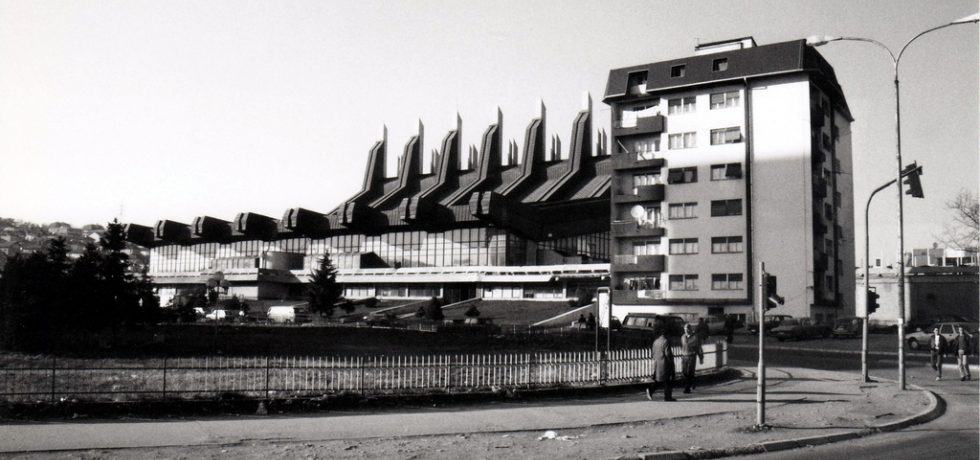The first international I ever met in Prishtina asked me within a couple of beats of an opening introduction if I’d ever been in an uglier capital. Had I?
I didn’t answer. I’d never been there outside of winter and up until that point, 75 percent of my memories of the town had been constructed from the hours of 7 p.m. and 7 a.m. In daylight, I’d lose my way, but soon as night fell I’d find myself in the same shadowy lanes and instantly remember where I was. At night, and especially at dusk, when you caught the cityscape from high up on Dragodan hill, Prishtina looked awesome. With snow all around, the building lights looked like the eyeballs of stone giants who had just woken up and weren’t happy to see some goofy tourist taking their picture. They might have crunched me in two if it weren’t for the 1 million and one loaded cameras parked on the U.S. Embassy walls behind.
It’s got a hint of Gotham about it. There’s the darkness and the angles, and if you read the papers there’s enough crime to keep two superheroes fighting. It’s not the easiest capital to live in. If sushi, H&M and an integrated urban transport system are what you mean by easy, then Prishtina and the whole of Kosovo in general are quite hard. But didn’t our mamas teach us that anything that comes easy goes easy, too? Kosovo’s hard, but that’s what makes it durable. That’s what makes you leave and come back again.
Thanks to Facebook, friendship has taken a depreciation in the last few years that only the Zimbabwean Dollar could match. I’ve got 800 people who’ll like my kitten post, but maybe only one or two I can really count on. Prishtina calls itself a city but functions as a village, and in villages people are friendlier. That is unless you’re a witch or some sort of cult leader, and then they administer village justice and you end up floating in a river. Prishtina has no river. But friendship in that town still carries a decent weight. If you drink in a bar twice, you’re a regular. If you smile at a stranger, they’ll smile back. And if you’re spotted alone with a girl, the rumor mill will whirl into action.
Hospitality is huge. Huger still when you consider that visa restrictions and the slow speed of politics mean you won’t be returning the favors for many, many years. The kind people offering you dinner, beds and their free time to take you by the hand and lead you through the streets aren’t expecting anything in return.
If you see a box of cigarettes on the table, you can take one. That’s why they’re on the table. It’s not showing off, it’s sharing.
One Sunday, we took off into the woods around Prishtina. There was a small covering of snow and it was cold enough that we were walking fast, not strolling. We followed a trail marked by dashes of paint on stones. Some were pink; some were green. We forgot which ones we were following but assumed that eventually our route would bring us full circle and back to our bus stop. But it wasn’t simple. Or actually maybe it was simple, but by then we’d let our imaginations off the lead and they’d run wild. We were freaking out. It wasn’t even dark yet, but Christ, we were already spooked by our shadows. The tree shapes were transforming into monsters and anything that looked manmade we were convinced was a bomb or some unexploded device. There were mines in Kosovo still. There were mines exactly here. We were with a local. She’d told us, and she was spooked too. The route should have been turning but instead we were still climbing up the hillside and into darker woods. We got to the point where we were half way to the top, we guessed. And then charged by the thought that maybe we were being followed, we decided to keep going on rather than turn back. Man it was cold and it was frigging Kosovo, and this whole trip was taking a nasty turn. Eventually, we saw the light of a guesthouse and felt our way onto a tarmac road. We jogged a little, right past an abandoned hotel with mine warnings wrapped round the broken walls like Christmas decorations. We sipped hot chocolates and left a box of cigarettes on the table. We smoked them all until another local friend arrived and said, “Come on guys, you weren’t really afraid?”
And then we laughed and did actually come on, and weren’t afraid anymore.
Kosovo can be dangerous, but what’s more dangerous are your preconceptions. I guess it’s normal to pack a little fear on board when you travel to a place most people remember as a battle rather than a country. But that fear will send you running through the hills like a loon if you don’t manage to keep it in check.
And if you’re afraid of the woods, you’ll probably be afraid of the grill-houses, the dark alleys and the smoky rooms. And if that’s the case, you’ll know just 20 percent. If you’re not afraid and you eat the eyeballs, brave the backroom bars and just stop panicking about the lack of fresh air and take up smoking. You’ll get to see as much as 60 percent of the place, and not many people see more than that.
The beauty in Kosovo is a lot like small talk. It’s pleasant, but it’s just a subterfuge for two people who don’t want to get to the point. The Prizren castle has more barbed wire around it than a prison. And if you want to visit the Rugova Valley, you’ve got to pass through Peja, a town that was almost burned to the ground in the 1999 war. They’re like creases on an otherwise smooth sheet, but in Kosovo the creases inform the shape. The creases are the shape. You can’t possibly understand how the same friends can meet up in the same bar four nights in a row or are content to do nothing so long as it’s in company or why everyone smokes so much — that is until you understand what was once taken away from Kosovars and what is still taken away from them today.
Kosovar culture slips past the border rarely. It’s trapped inside the country. That’s a shame because a nation that can’t explain itself to the world through its culture, isn’t a nation, it’s just an economy. In a way, that’s why hospitality and conversation are so common in Kosovo. Visitors get lectured. Locals load you up with anecdotes, songs and idiosyncrasies if you let them.
If you want to survive Kosovo, you probably should let them. You probably should leave that heavy weight of fear in the arrivals lounge, and yes, you should probably eat whatever is put in front of you and not keep your cigarettes in your pockets. And if someone asks you to go for a walk in the hills, do that, too.




